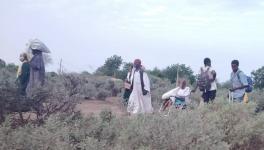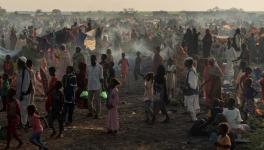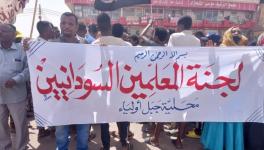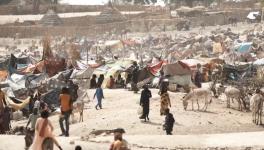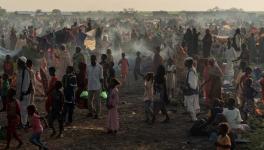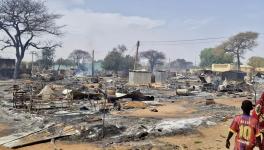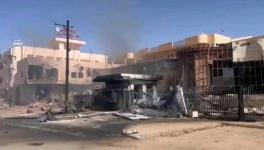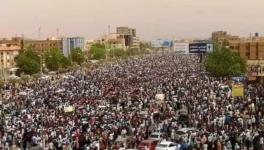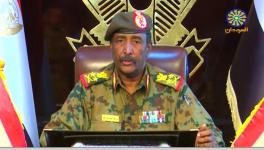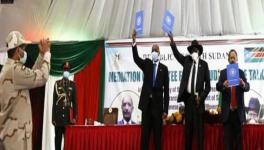Civilians Brace for Worst as Fighting May Intensify Between Sudan’s Military Rulers
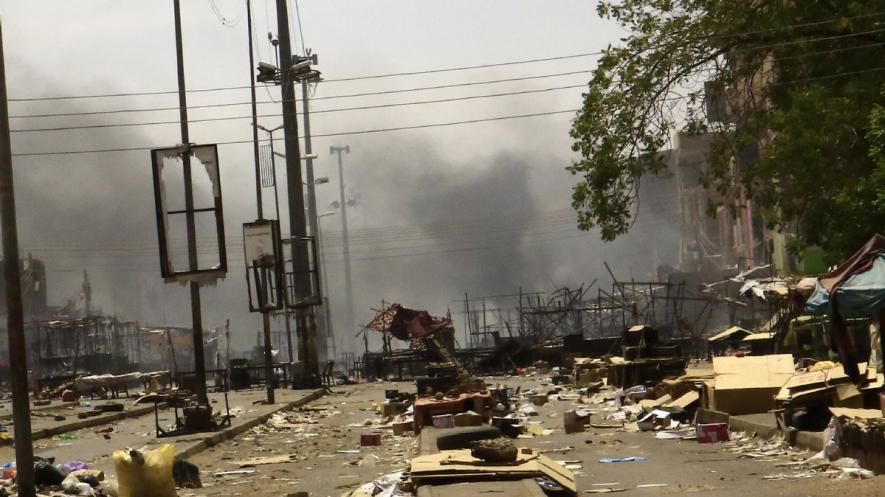
The devastation in Khartoum. Photo: Xinhua
Millions in Sudan are bracing for an escalation in fighting that is widely expected after the completion of the evacuation of foreign nationals. The evacuation is currently underway with assurances of cooperation from both the warring parties — the army and the paramilitary Rapid Support Forces.
After the US and UK moved troops to neighboring Djibouti last week, indicating readiness to support the evacuation militarily if needed, the chairman of the military junta and chief of the Sudanese Armed Forces (SAF), Abdel Fattah al-Burhan, assured his cooperation. “We share the international community’s concern about foreign nationals,” he said in an interview on April 22, promising in another to provide the “necessary airports and safe passageways.”
General Mohammed Hamdan Dagalo, a.k.a Hemeti, the deputy chairman of the junta and head of the paramilitary Rapid Support Forces (RSF) that is fighting against SAF, also stated his readiness to partially open the airports under his troops’ control to help with the evacuation.
Four years after seizing power together to protect military rule from the pro-democracy movement known as the December Revolution which forced the former dictator Omar al Bashir out of power in April 2019, Burhan and Hemeti have now turned against each other.
Their troops are fighting with heavy weapons in densely populated cities. The RSF, which has the advantage of maneuverability, is taking positions in residential areas, which the SAF has been shelling with tanks and striking from airplanes.
“It is expected” that the SAF and RSF, which are “only concerned about the lives of foreign nationals,” will further intensify fighting after their evacuation, “without regard for the sanctity of the lives” of Sudan’s “defenseless citizens,” the Sudanese Doctors Union (SDU) said.
In a statement on April 22, the SDU said that the “evacuation of foreign nationals is an indication of the failure of the demand for a ceasefire,” reflecting the assessment of the international community that the armed conflict will “spread in residential neighborhoods in a large area of the country.”
The death toll has already exceeded 500, and thousands have been injured. Amid the surging civilian casualties, 72% of the hospitals in and around the conflict zones have gone out of service, the SDU said in another statement on Wednesday, April 26.
Only 23 of the 82 essential hospitals in these areas are functioning, with some only offering first aid. There is intense pressure on these remaining hospitals to also shutter down as the shortage of medical supplies, electricity, water and food — and the risks to doctors who have also suffered casualties in the line of duty — is worsening with each passing day.
Of the 59 hospitals that have been forced out of service, 14 have been bombed. Seven of these are in the national capital Khartoum, which has seen the most intense fighting as the SAF and the RSF have battled to control the airport and the armed forces’ HQ. Located just beside these contested sites are the neighborhoods of Khartoum 1 and Khartoum 2 — among the worst-affected residential areas.
Resistance Committees, which led the pro-democracy protests, are now at the forefront of relief-and-rescue operations
The “RSF troops are all over the place, randomly breaking into people’s homes. There are constant clashes between RSF & SAF,” making it “extremely dangerous,” not only to commute but also to “stay put in homes because stray bullets may come in through the windows at any moment,” Mahmoud (name changed) told Peoples Dispatch. He is the spokesperson of the Resistance Committee (RC) of Khartoum 1 and Khartoum 2.
A network of over 5,000 such RCs, organized in neighborhoods across the country, had been spearheading the mass demonstrations against military rule. Since the armed conflict broke out within the military junta between its chairman and deputy chairman on April 15, the RCs have been at the forefront of the efforts to organize for relief and rescue civilians trapped in the line of fire.
Organizing pro-democracy protests under the constant threat of arrests and sudden blockades of internet and telecommunication “has taught us how to get things done by working in smaller groups without communicating with each other for days,” said Mahmoud.
Scouting alleyways and monitoring movements of the warring parties, the RC members are constantly identifying the safe routes to escape from these neighborhoods at a given time and coordinating with the residents who choose to evacuate, he explained.
Nevertheless, the journey to safer locations remains a high-risk affair. Even when one successfully avoids getting caught in the crossfire, there are multiple checkpoints manned by the RSF along the main roads, allegedly at less than a kilometer’s distance from each other on several stretches. “At any one checkpoint, you could be sent back or shot or have your car or belongings stolen,” Mahmoud said.
Those who stay behind to avoid this risk are facing a shortage of food, and lack water and electricity, whose supply has stopped in much of the city. Working out the logistics to bring food and water under fire to the stranded civilians in these neighborhoods is another key task undertaken by the RCs. Generators in the vicinity are identified and made available for the stranded civilians to charge their phones.
The RC members can quickly identify who is in need and who is in a position to help because they had already familiarized themselves with all the families in this neighborhood in the course of mobilizing them for the pro-democracy protests, Mahmoud explained.
This high level of organization of the civil society is a key asset, on the strength of which the Sudanese people are enduring this crisis, said Dr. Husam El-mugamar, founder of Sudan’s Doctors for Human Rights.
“However, this cannot sustain indefinitely,” he told Peoples Dispatch. “Soon, nobody will be left with anything to share with others. Ensuring continued provision of food, water and fuel will become impossible if the fighting continues.”
Money sent home by members of the diaspora like himself was an important source of sustenance, even before, but especially after, the fighting started. “But the bank app has stopped working. We are not able to send money anymore,” said the UK-based Sudanese doctor, who was anxiously coordinating over phone the evacuation of his family members from a fighting-affected area in Khartoum to safety.
With banks shuttering soon after the fighting started, there is a severe shortage of cash. “So people were relying on this app to make payments. Now that the app has also stopped working, they are left with no means to transact,” he said.
Healthcare on the verge of complete collapse
Most worrying to Dr. Husam is the looming possibility of a complete collapse of the healthcare system, which is functioning to the extent that it continues to function, thanks only to “my highly organized and committed colleagues in Sudan,” he added, referring to the SDU. Like the RCs, the doctors’ union was also organized against the backdrop of the pro-democracy movement’s resistance to military rule.
“Among their members, there are highly qualified professionals with expertise in public health management,” he said, warning, however, that despite their best efforts, the complete collapse may become inevitable if the fighting continues.
Already, on the third day of the conflict, Dr. Ahmed Al Mandhari, WHO Regional Director for the Eastern Mediterranean, had raised the concern about the “reports of military strikes against health facilities, hijacking of ambulances while patients and paramedics are on board, looting of health facilities, and military forces occupying health facilities.”
Attacks on hospitals continued as the conflict entered the tenth day on Tuesday, April 25, when Rumi Medical Center in Khartoum’s adjoining city of Omdurman was struck by a missile, “causing several injuries,” according to the SDU. Many of the injured are in an unstable condition, and in need of surgical intervention.
In Khartoum Bahri, to the north of capital Khartoum, the Bahri Teaching Hospital had been bombed earlier, along with four others in El-Obeid, the capital city of North Kordofan state, 400 km southwest of Khartoum.
A total of 19 hospitals, 14 of which were bombed and five others at risk of being bombed, were evacuated. “To the extent possible, the patients admitted in these hospitals have been relocated to other hospitals, but obviously not with 100% success. Medics are trying to move patients around while the army and the RSF are shooting around in the city,” Dr. Husam said.
About 40 other hospitals have had to stop service due to a shortage of staff and inability to procure supply of medicines, food, water and electricity, the SDU added. “Access to healthcare has become extremely restricted, and often impossible,” said Dr. Husam.
Explaining the precarious state of Sudan’s hospitals even before this armed conflict broke out, he recollected, “About 12% of our national income used to be allocated to healthcare,” before the former dictator Omar al Bashir took power with the military coup in 1989.
The 30-year-rule of his Islamist regime saw several civil wars, leading to the secession of South Sudan, and the alleged genocide and war crimes in the western region of Darfur in the 2000s. These atrocities were committed using state-backed militias that subsequently coalesced to form the RSF in 2013.
The harsh repression against the left and progressive political parties, trade unions, and the broader civil society was unleashed alongside a program of economic liberalization, characterized by rampant privatization and budget cuts to all public services.
Sudan’s health budget in this period, Dr. Husam said, was reduced from 12% of the national income in 1989 to just 2% in April 2019, when Bashir was forced out of power by the pro-democracy mass protests that had started in December 2018.
During the short-lived joint civilian-military government from August 2019 to October 2021 — in which the generals had briefly shared power with a coalition of conservative right-wing parties — the health ministry, then under civilian control, had mooted an “ambitious plan”.
“Many doctors in the diaspora went back to Sudan from the UK and the US to help,” he recalled. However, the military — which had retained control in this government over defense, police, foreign policy and much of the economy — seized all power, including over the health ministry, with the coup in October 2021.
‘As soon as the fighting stops, we will take control of the streets again’
The military junta — led by Chairman Burhan and Deputy-Chairman Hemeti — have since starved Sudan’s healthcare system “to the bone,” he said. With this eruption of armed conflict between the two generals, “they are now even bombing the hospitals that were already crumbling,” he added. Their rehabilitation, he maintained, will be an enormous uphill task, beyond the competence of the military junta, “even if this war stopped right now.”
Dr. Husam insisted that a complete overthrow of the military junta is “absolutely necessary” to secure the right to health, along with other basic human rights.
It is immaterial who wins this infighting between the coup leaders, said Osama Saeed, a member of the Sudanese Communist Party (SCP), who used to take part in the regular mass demonstrations against the coup government in his city of Omdurman.
Because regardless of whether it ends with the victory of the SAF or of the RSF, or a stalemate resulting in an agreement between the two forces, “as soon as the fighting stops, we will take control of the streets again, and topple the military rule with a political general strike,” he told Peoples Dispatch.
Get the latest reports & analysis with people's perspective on Protests, movements & deep analytical videos, discussions of the current affairs in your Telegram app. Subscribe to NewsClick's Telegram channel & get Real-Time updates on stories, as they get published on our website.









